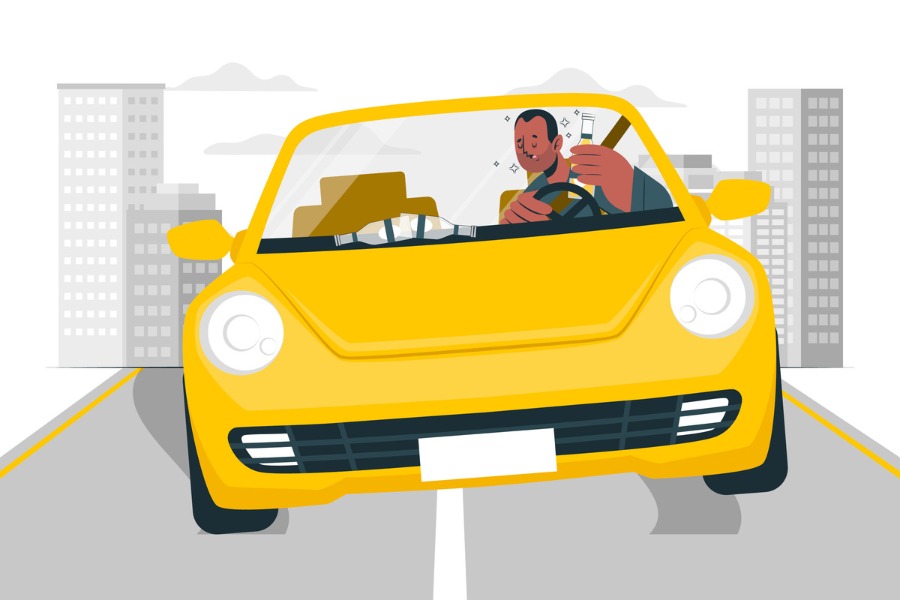Imagine going to a party, drinking a little bit more than you can handle, and getting behind the wheel to drive back home. What do you think happens next? Do you reach home safe and sound? Or do you get caught driving drunk? Or do you end up getting involved in a fatal accident? Believe it or not, the last option is often what often happens to those who choose to drink and drive. Approximately 30% of fatal crashes in Australia every year are due to drunk driving. Roman philosopher Seneca once said, ‘Drunkenness is nothing but voluntary madness’. And how awfully right he was! You lose control for a moment and end up changing your life forever. So, when your driving school teachers tell you to avoid driving drunk, you should listen well. Alcohol does more than simply make you lose inhibitions. It affects your vision, judgment, coordination, and decision-making abilities. Hence, it increases the risks of accidents and puts you and others on the road in danger. Here’s why drunk driving is dangerous and should be avoided:
Dangers of Drunk Driving
Alcohol impairs your faculties and makes you vulnerable and unable to drive properly. Let us look at how it affects your driving abilities:
It Impairs Judgment:
Alcohol clouds your judgment, making it harder to make safe driving decisions. Drivers are responsible for the safety of all road users. They must make safe driving decisions like wearing a seatbelt and stopping for pedestrians. Alcohol interferes with the functions of the nervous system and affects how the brain works. It can lower your inhibitions and affect perception, thus clouding your judgment. It impairs cognitive abilities and makes it difficult to think clearly and make safe driving decisions.
It Slows Down Reaction Time:
Alcohol hinders the brain’s ability to process information and make decisions. Under the influence of alcohol, drivers take more time to think which slows down their reaction time and increases the risk of accidents. Alcohol also decreases the brain’s ability to judge speed and distance leading to miscalculations and mistakes while driving.
It Affects Your Coordination:
Alcohol impairs coordination, affecting your ability to control the vehicle. Driving requires hand-eye coordination, muscle strength and memory, and precise handling of vehicle controls. Alcohol affects the nervous system and leads to a decline in motor skills. It slows down reaction time and reduces the driver’s hand-eye coordination and precision in movements and handling of vehicles. Reduced coordination can hinder the driver’s ability to handle changing road conditions or follow traffic regulations.
It Raises the Chances of Accidents:
Drunk driving poses a big risk for both the drivers and the pedestrians. Driving under the influence of alcohol can obscure vision, reduce response time, and hinder coordination, making driving safely and coherently a challenge. Drunk drivers are also more likely to make bad decisions and take unnecessary risks like speeding or trying a risky maneuver. This lack of control greatly increases the chances of the driver causing or getting involved in a serious accident.
It Has Severe Legal Consequences:
Getting caught drunk driving leads to heavy fines, jail time, and loss of your license. Along with the physical and emotional harm, drunk driving can also have some serious legal consequences. It can lead to hefty fines and even cause license suspension, mandatory alcohol education programs, and even imprisonment in severe cases.
It Endangers Others:
While drunk drivers are at risk of getting hurt, they are also a big threat to other road users. Intoxicated drivers lack judgment, coordination, and mental alertness which puts themselves as well as others on the road at risk. They can end up hurting their passengers, other drivers, and pedestrians due to their intoxicated behavior.
It Can Cause Emotional and Mental Harm:
If you harm someone while drunk driving, the guilt can last a lifetime. Driving drunk and getting into an accident is often not the end of the story. Other than legal fines, accidents also leave mental scars. Hurting another driver or pedestrian in a state of insobriety can lead to emotional turmoil and feelings of guilt, regret, anxiety, depression, and post-traumatic stress disorder. Moreover, the stigma and shame associated with drunk driving can also cause psychological trauma and social isolation in drivers.
Alternatives to Avoid Driving Under the Influence:
The first thing your driving school instructor would teach you about drunk driving is to avoid getting behind the wheel as much as possible. Intoxicated drivers lose control of their mental faculties and often take unnecessary risks. They cannot control their movements and reactions or handle the vehicle properly. Hence, it’s always better to avoid driving under the influence. Ordering a taxi or sharing a ride can help drivers to avoid driving drunk. However, getting a designated driver or having a friend or colleague be your wingman is probably the best and the safest alternative to driving under the influence of alcohol.
Conclusion
While a driving school like Onroad Driving Education or an instructor can teach you the most complex driving techniques to handle any challenge on the road, they can’t help you stay mentally alert and aware after drinking. The consequences of drunk driving are many and far-reaching. Apart from the legal and financial damage, a drunk driving accident can also cause mental and emotional strain. It can affect your life and future in various ways. Hence, it’s important to avoid alcohol intake when planning to drive to maintain personal and road safety. And when alcohol is consumed, opt for alternative transportation options to keep yourself and others on the road safe. Only by choosing safer options and staying safe can we reduce the incidents of drunk driving and its devastating effects on individuals and society at large.
